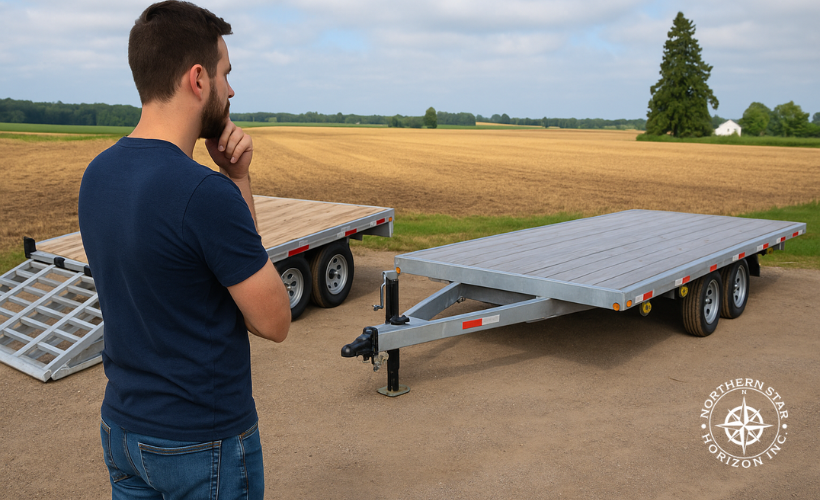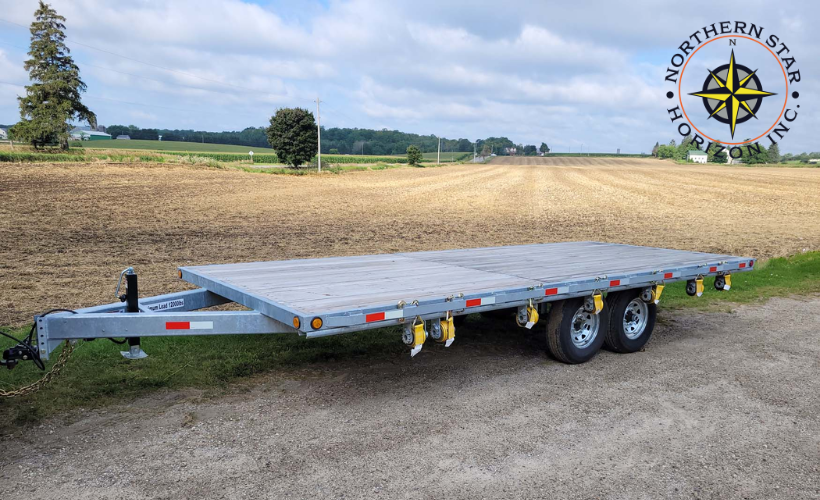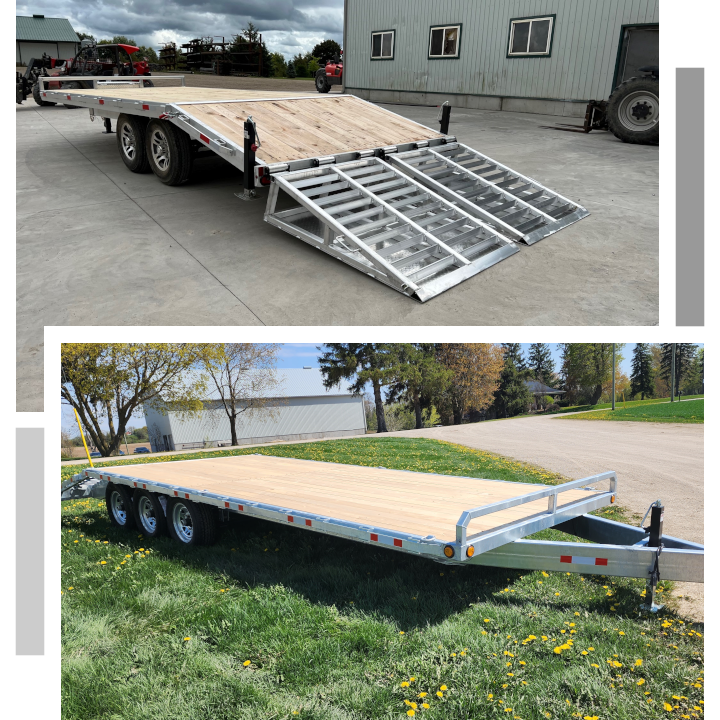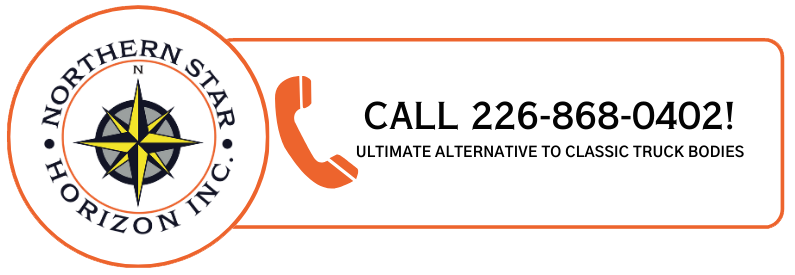Deckover vs. Beavertail Trailers: Which Trailer Suits Your Ontario Farm?

Ontario farmers need reliable trailers to move equipment and materials. The choice often comes down to two popular flatbed designs. Understanding the differences between deckover vs. beavertail trailers helps you pick the right equipment for your farm. Each design offers unique benefits for loading and unloading. This guide explains both types and helps you decide which one fits your needs.
Understanding Deckover Trailers
A deckover trailer has a flat deck that sits on top of the wheels. The deck extends over the entire frame width, creating a wider loading surface with no wheel wells in the way. Most deckover trailers measure 8 to 8.5 feet wide, giving you maximum space for wide equipment.
The deck sits higher off the ground because it rests on top of the frame and wheels. The trailer comes in both standard duty and heavy-duty configurations depending on your hauling needs. The flat surface runs from front to back without obstacles, making it ideal for tractors, implements, and other wide farm equipment. The stability of the wide platform works well for contractors hauling oversized loads.
Understanding Beavertail Trailers
A beavertail trailer has a sloped rear section that creates a built-in loading ramp. The deck sits between the wheels instead of on top of them. Most models feature a bumper pull design for easy towing with standard trucks.
The rear section angles down gradually at 15 to 20 degrees, letting equipment drive onto the trailer easily. Some models include a tilt mechanism for even easier loading and unloading. The lower height improves safety during operations. This efficient design offers an ideal solution for daily equipment movement.
Main Differences Explained
Width and Deck Space
Deckover trailers provide wider flatbed surfaces because the deck extends over the wheels. This extra width matters when hauling wide equipment or multiple items. Beavertail trailers are narrower since the deck fits between the wheel wells, limiting cargo width by 6 to 12 inches. However, the balance between strength and maneuverability remains excellent for standard-width equipment.
Loading Height and Safety
Beavertail trailers sit low at 18 to 24 inches off the ground, making loading and unloading easier and safer. Deckover trailers sit high at 30 to 36 inches, requiring ramps or equipment to load heavy items. The stability improves once equipment sits on the deckover deck.
Ramp Systems
Beavertail trailers include an integrated ramp that’s always ready, saving time during loading and unloading operations. Deckover trailers need separate ramps, adding setup time but offering loading flexibility from different sides.
Key Benefits of Deckover Trailers
Deckover trailers excel for hauling wide equipment that other trailers cannot accommodate. Wide tractors, combines, and implements fit safely on the full-width surface. You can haul multiple items side by side, saving trips when moving several pieces of equipment.
The heavy-duty frame construction provides reliability for demanding jobs. Large round bales, pallets of feed, and building materials sit securely on the flat surface without flexing. This stability ensures safe transport even on rough farm roads.
Northern Star Trailers builds deckover models for Ontario farms. The extra width proves valuable for modern farm equipment that exceeds standard sizes. Customization options let you match the trailer to your specific needs, including color options to match your fleet.
Key Benefits of Beavertail Trailers
Beavertail trailers shine for frequent loading tasks. The built-in ramp saves time when you move equipment multiple times daily, reducing physical strain during loading and unloading. Solo farmers can load tractors and implements without help, and the safety advantages become clear when working alone.
The low profile fits in barns with limited ceiling height, and the compact design helps with tight maneuvering spaces. This bumper pull style offers excellent reliability for daily use. Daily property maintenance goes faster, making it ideal for contractors who load equipment frequently. The efficient design adds up to significant time savings over weeks and months.
Performance in Ontario Conditions
Ontario weather challenges all farm equipment. Both designs handle snow, ice, mud, rain, and road salt differently. Reliability in harsh weather depends on proper construction.
Deckover trailers shed water and snow easily, though the higher frame catches more road salt spray in winter. Heavy-duty models stand up better to winter conditions with regular cleaning. Beavertail trailers can collect debris in the sloped section, requiring regular cleaning. Moving parts like hinges need lubrication to prevent freezing. The lower position protects frame components from salt spray.
Northern Star Trailers uses weather-resistant materials for both designs. Clean your trailer after each season and apply protective coatings to bare metal for extended trailer life.
Loading on Different Terrain
Your farm’s terrain affects which trailer works better. Soft or muddy ground works better with beavertail trailers because the low deck height needs less ground clearance. The ramp touches down at a lower point, reducing the chance of sinking during loading and unloading operations.
Steep grades favor beavertail designs. The gentler loading angle makes climbing onto the deck safer for equipment and operators. Deckover trailers require steeper ramp angles on sloped ground. Some models offer tilt features for better ground contact. The stability of both types depends on proper loading techniques.
Cost and Value Comparison
Beavertail trailers typically cost less for similar weight ratings due to simpler construction. Standard duty models offer the best value for light to medium use. Deckover trailers cost more but offer greater versatility with wider flatbed surfaces that handle more cargo types. Heavy-duty construction adds to the price but improves reliability.
Consider accessories needed. Deckover trailers require separate ramps, adding to initial cost. Beavertail trailers include the loading ramp in the base price. Some trailer comes with customization options like color options and additional tie-down points.
Long-term value depends on your use. A trailer that saves time daily pays for itself faster. The ideal choice balances initial cost with long-term efficiency.
Making Your Decision
Measure Your Equipment
Measure your widest tractor, implement, or vehicle before shopping. Equipment over 7 feet wide needs a deckover trailer. Standard equipment fits on beavertail models. Think about future equipment purchases, as farm equipment continues to grow wider. The ideal trailer grows with your operation.
Count Your Loading Cycles
Daily loading favors beavertail convenience. Weekly loading makes deckover setup time acceptable. Efficient loading and unloading matters most for busy contractors. Multiple loads per day add up to hours saved weekly. Safety improves when loading becomes simpler and faster.
Check Your Storage and Help Needs
Measure your storage building height and width. Deckover trailers need more vertical clearance. Consider your tow vehicle and regular routes, as some bridges have height limits. Bumper pull designs work with most standard trucks.
Solo operators benefit from beavertail simplicity. Teams can handle deckover ramp setup easily. Physical ability matters too, as setting up heavy ramps becomes harder with age or injury. The ideal setup matches your physical capabilities and work situation.
Choose Your Farm Trailer Today
The choice between deckover vs. beavertail trailers depends on your farm’s specific needs. Deckover trailers provide maximum width for oversized equipment with excellent stability. Beavertail trailers offer unmatched convenience for frequent loading and unloading with standard-width equipment. Match the trailer design to your daily tasks for best results and reliability.
Northern Star Trailers in Listowel, Ontario, serves farms and contractors across the province with quality equipment trailers. We stock both deckover and beavertail models built for heavy-duty use and long-term reliability. Each trailer comes with customization options including color options. Visit our showroom to see both flatbed types in person or call us to discuss which design offers the ideal balance between strength and efficiency for your operation. We deliver throughout Ontario and help you select the right trailer for your farm.
The post Deckover vs. Beavertail Trailers: Which Trailer Suits Your Ontario Farm? appeared first on Northern Star Horizon.
source https://northernstartrailers.ca/deckover-vs-beavertail-trailers-suits-your-ontario-farm/



Comments
Post a Comment